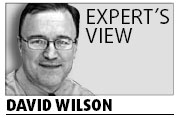Revival in US takeovers after brush with death
Updated: 2007-09-05 07:19

Speculation about higher takeover offers for US companies is beginning to recover from a near-death experience in August.
Even before Accredited Home Lenders Holding Corp rejected a revised buyout bid from Lone Star Funds last week, shares of the subprime-mortgage lender rose as much as 8.6 percent above the proposed price.
Hearst-Argyle Television Inc changed hands throughout last week for more than Hearst Corp agreed to pay for the shares it doesn't already own.
Hearst-Argyle, an owner of 26 television stations, closed 8.8 percent higher than the August 24 bid.
Gaps that wide would have been almost impossible to find earlier in the month, when financing for takeovers and buyouts evaporated after credit markets seized up. August 15, when the Standard & Poor's 500 Index set its low for the month, is a good example.
There were 126 US takeover targets valued at more than $250 million that day, according to data compiled by Bloomberg. Only three - Topps Co, Ventana Medical Systems Inc and Wells Real Estate Investment Trust Inc - closed above the prices offered by their respective suitors.
Topps, a maker of baseball cards and Bazooka bubble gum, had two would-be buyers at the time: Upper Deck Co and a group led by Michael Eisner, Walt Disney Co's former chief executive officer. Upper Deck later dropped its bid, sending the stock below the price of the Eisner group's offer.
Ventana, a cancer-test maker that Roche Holding AG wants to acquire, and Wells, an owner of office and industrial properties sought by two other REITs, are still above their bid prices.
Far more target companies - 17, in all as of Thursday - change hands at prices that would generate profits of more than 10 percent if deals are completed.
The discounts signal concern that buyers may fail to obtain financing or drop their offers.
Accredited, based in San Diego, was in that group. Lone Star's revised bid of $8.50 a share was 35 percent higher than the stock's close on Thursday, when the proposal was made. The Dallas-based firm originally offered $15.10 a share in June.
The price reduction wasn't surprising. Accredited is among the victims of the subprime industry's collapse. Last week, the company stopped taking mortgage applications and said it would close more than half its operations and fire 1,600 employees.
Neither was the response. Accredited accepted Lone Star's first offer and went to court last month to force the firm to complete the purchase.
Investors clearly anticipated how Accredited would react. The stock jumped as high as $9.23 a share on Friday and ended the day - and the week - at $9.05, or a 6.5 percent premium.
Hearst-Argyle's stock performance shows the $23.50-a-share offer from Hearst won't do either. The New York-based company's shares closed at $25.57 last week and changed hands for no less than $24.55. Hearst owns a 73 percent stake in Hearst-Argyle.
Don't take this to mean happy days will be here again soon for those betting on takeovers.
The credit markets are still too shaky for that. For now, it's enough that some of the doom and gloom affecting mergers and acquisitions is dissipating.
US companies that went public in August were a bright spot in a volatile stock market. Most of them did better than benchmarks such as the S&P 500. Whether they can keep up that kind of performance is another matter.
Eighteen companies completed initial public offerings last month, and their median gain was 7.5 percent, Bloomberg's data shows.
The S&P 500 added just 1.3 percent. VMWare Inc, an EMC Corp unit whose software allows server computers to run more than one operating system, led the pack by more than doubling.
VMWare is valued at 114 times analysts' average earnings forecast for this year, according to data compiled by Bloomberg.
Aside from a couple of real-estate investment trusts, no S&P 500 company trades at a higher ratio.
Even if the stock surmounts that obstacle, last month's IPOs may have trouble adding to their gains.
The Bloomberg IPO Index, whose members all went public during the past 12 months, dropped 3.4 percent in August. Out of 25 companies that debuted in July, only 10 ended last month above their IPO prices.
The current turmoil in financial markets has taken more of a toll on Moody's Corp and McGraw-Hill Cos, owners of the two largest credit-rating companies, than Russia's debt default and Long-Term Capital Management LP's collapse did in 1998.
Moody's shares fell more than 10 percent in June, July and August, the worst performance since the New York-based company was split from Dun & Bradstreet Corp nine years ago. If they drop this month, the streak will become the longest ever.
Losses at McGraw-Hill, whose Standard & Poor's rating unit produces the bulk of its revenue, surpassed 10 percent in each of the past two months. The last back-to-back declines of that magnitude occurred in 1990. The stock hit bottom on August 20 at 16.4 times earnings, a 12-year low.
The stocks retreated as US and European regulators began studying whether Moody's and S&P failed to adequately judge the risks of securities backed by subprime mortgages.
S&P also lost President Kathleen Corbet, who quit last week and was replaced by Deven Sharma, an executive vice-president.
David Wilson is a Bloomberg News columnist. The opinions expressed are his own.
(China Daily 09/05/2007 page16)
|
|
|
||
|
||
|
|
|
|